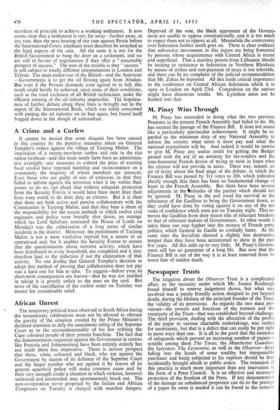African Unrest
The temporary political truce observed in South Africa during the tercentenary celebrations must not be allowed to obscure the gravity of the situation created by the Prime Minister's declared intention to defy the unanimous ruling of the Supreme Court as to the unconstitutionality of his law robbing the Cape coloured people of their present franchise. The fact that the demonstrations organised against the Government in centres like Pretoria and Johannesburg have been entirely orderly has not made them less impressive. There is serious prospect that those, white, coloured and black, who are against the Government by reason of its defiance of the Supreme Court and the larger number who are against it by reason of its general apartheid policy will make common cause and by their very strength create a situation in which violence, however undesired and unintended, may spontaneously break out. The non-co-operation move proposed by the Indian and African Congresses on Tuesday is charged with manifest dangers. Deprived of the vote, the black opponents of the Govern. ment are unable to oppose constitutionally, and it is too much to expect them not to oppose at all. Meanwhile the controversy over federation further north goes on. There is clear evidence that subversive movements in this region are being fomented by persons whose acquaintance with Central Africa is recent and superficial. That a stateless person from Lithuania should be inciting to resistance to federation in Northern Rhodesia by means of strikes and non-payment of taxes is not tolerable, and there can be no complaint of the judicial recommendation that Mr. Zukas be deported. All this lends critical importance to the conference on Central African federation which is to open in London on April 23rd. Compulsion on the natives might have disastrous results. Mr. Lyttelton must not be hustled into that.


































 Previous page
Previous page